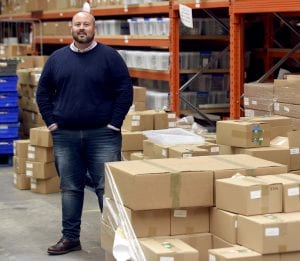
The vapor industry is suffering serious hardships due to closures caused by Covid-19.
By Timothy S. Donahue
Several countries have considered vape shops essential businesses during the coronavirus pandemic. Countries such as Spain, France and New Zealand have allowed e-cigarette users to continue to have access to nicotine without returning to combustible cigarettes. In many countries such as the U.K. and the U.S., however, vape shops have been forced to close and many business owners say they may never be able to recover.
In the U.K., VPZ, the country’s largest vapor retailer, vowed to keep its shops open. On March 20, the company urged British leaders to follow the lead of other European countries and allow all 155 VPZ stores across the U.K. to be added to the list of essential businesses. That request was denied. On March 23, VPZ announced it would be closing all its locations. In an email, Doug Mutter, director of compliance and manufacturing for VPZ, said the company was disappointed with the lack of explanation from the government concerning the status of vapor retailers.

“Other European nations had recognized the work vaping specialists do in reducing the stress on health services and [have] kept the local stores open,” he said. “We had expected this to be the case and had begun investing in new processes in order to manage our business in such an environment. However, without sufficient clarification and in the interest of keeping our staff and customers safe, we have made the decision to close all 155 stores … for the next three weeks.”

James Jarvis owns four shops in the U.S. state of Ohio. Jarvis also heads the Ohio Vapor Trade Association (OHVTA), an industry advocacy group. He closed his Vapor Station locations in Clintonville, Columbus, Gahanna and Hilliard on March 23. He said that while the governor of Ohio has shown great empathy to Ohioans regarding the coronavirus, the OHVTA knew it needed to recommend that its members make consumers aware that a stay-at-home order or shutdown would be likely at some point, and all shop owners needed to inform customers.
“Many of the shops ran specials, extended hours … to make sure if something happened our consumer family would be well stocked up. I talked to members as well as looking at our own numbers, and over the last few weeks [during the increase in virus reporting], sales were definitely on the rise,” Jarvis told Vapor Voice. “The unfortunate day came on March 22 as an order was signed and a deadline for nonessential business [to close] was set for 11:59 p.m. [on] March 23.”
The total impact on vape shop closures in the U.S. will be hard to calculate, according to Jarvis. He says that if stores are forced to be closed for more than 14 days, many vapor consumers will get frustrated and turn back to cigarettes, which he says is a huge step backward for public health. “The longer we are closed, the more distant we will be to the consumer,” he explains. “This will also have a negative effect on our employees and our businesses as the uncertainty of how bills, rents and other necessities will be handled.”
Luckily for Ohioans, the state allows for online sales of vapor products. Many states, such as Utah, Massachusetts, Rhode Island and Washington, have banned the online sale of vapor products. Jarvis says that the challenge is that even if a state allows for online sales, only online sales “will have a dramatic effect on conversion rates for smokers.” He says he worries about smokers using whatever products they can find at their local gas station or c-store and not getting the full education on the products they are using.
“Vape shops take the time to educate on the products, liquid options, safety and advocacy. With that element being gone, there will be too many opportunities that will be missed, and someone could wind up with a device or liquid that may not be the right thing, the right [nicotine] strength or will be operating the device unsafely,” he says. “In many states, the vape shop also educates on advocacy and any state with a ban or tax increases; it will now be harder to communicate those points to them as well. If the vape shops go away, the true heart and soul of the industry goes away and will be handed over to the very company [large tobacco companies] we are trying to destroy.”
Jarvis says the industry is also readying for premarket tobacco product application (PMTA) submissions due to the U.S. Food and Drug Administration (FDA) on May 12. The FDA submitted a request to postpone the deadline to the Maryland judge who set the deadline, but as of this writing, no decision had been made.
“I am hopeful that the FDA will do the right thing, but we need to act as if they will not and continue our due diligence to successfully start and complete a PMTA. There is a group on Facebook called ‘PMTA Sharing’ that is an amazing resource for small manufacturers,” says Jarvis. “Char Owen and her husband are really going to great lengths to make starting and completing the necessary paperwork as easy and painless for all small manufacturers in that group. They are sacrificing a lot of their own personal time and finances and sharing with the group.”
Jarvis suggests that even if the Ohio leadership changes its mind and allows vape shops to open, there will still be additional challenges. For example, the early Chinese New Year and the outbreak of Covid-19 have made finding some hardware products produced in China more difficult. He explains that even though the Chinese factories are operating again, the virus started to spread in the U.S., and changes were made to customs with regard to shipping.
“We also had many other states issuing orders that had stoppage effects on shipping. There is definitely a strain on the flow of products right now. The one thing we have been seeing, which is amazing, is that stores are sharing products with other stores, [and] distributors are limiting quantities and working overtime, so everyone gets a little,” he says. “This is truly a community that looks out for one another. It’s great feeling like a part of a group of people that are selfless and want to make sure the consumer and our small businesses are protected at the end of the day.”
On the other side of the U.S., Burbank, California-based online vapor retailer ProVape says the vapor industry is going to continue to feel the impact of the coronavirus outbreak. In Shenzhen, China, the vapor manufacturing capital of the world, businesses have been allowed to resume operation if they have stringent measures to prevent further spread of the devastating virus (see “Sanitary Solution”).
There is still a massive problem with the timely shipment of supplies, according to Art Harutyunyan, a senior executive of ProVape. Wholesale vapor suppliers must wait for the coronavirus crisis to end before they can get a steady supply of vaporizer products. “We are constantly told that products are on backorder and are encouraged to stock up with vape hardware [coils, vape kits, pod systems, mods, tanks and disposable vape devices] to avoid any issues in coming months,” says Harutyunyan, adding that the coronavirus is creating a global problem in the vapor industry as manufacturers of vapor products will not be able to produce and deliver some products before coils, pods and other vapor hardware dwindle to a frighteningly low number in the U.S. and around the globe.

Moving farther west, Patricia Anderson, co-owner of Black Lava Vape (BLV) on the big island of Hawaii, says that as of March 22, their three stores were still open for business, but they stopped vaping in the shop and were only allowing three people at a time in the store. They were also offering curbside service and delivery in a limited area.
“Last week [week ending March 21] and over the weekend were probably some of the best days we have had in succession in quite some time. In the vaping world, I would say our products are like toilet paper … people are very afraid that we will run out [of product] sooner or later, or they will close us as a nonessential business, and they will have to go back to cigarettes,” explains Anderson. “To be quite honest, the THC scare [black market THC products causing pulmonary issues] and the always impending ban on flavors was more detrimental to us than the coronavirus [pandemic]. During the THC scare, I had to lay off half of my employees, cut store hours, cut employee hours, and we have been unable to pay ourselves.”
During the scare, BLV shelves became very hard to stock, and customers even supposed that BLV was closing, says Anderson. The shop went from having more than 10 full-time employees to five, and three are part-time. She says BLV e-juices are all made in the U.S., but their hardware comes from China, and they started seeing availability issues with wholesalers too.
“We found out [the other day] that two of our wholesalers are not processing any more orders, so that will definitely have an impact on competitive pricing,” Anderson explains. Then the hammer dropped. “Hawaii will be on lockdown starting March 26. I’m guessing we will be closing our doors as I don’t see the state considering us to be an essential business [they are currently allowed to stay open doing curbside service but are not labeled essential]. Our loyal vaping community will disagree, but we knew it was coming; 90 percent of our customers have been laid off [from their jobs].”
Jarvis says that the industry can’t lose hope. He says the industry needs to continue to stand together and fight for this life-saving industry that has already saved millions of lives from deadly traditional cigarettes. “This industry, as I have said before, is an amazing one to be a part of. We are on the right side of everything,” says Jarvis emphatically. “As long as we continue to work together, look out for each other, stay focused … we can do anything. Together we will be stronger and healthier to be there for the future.”


